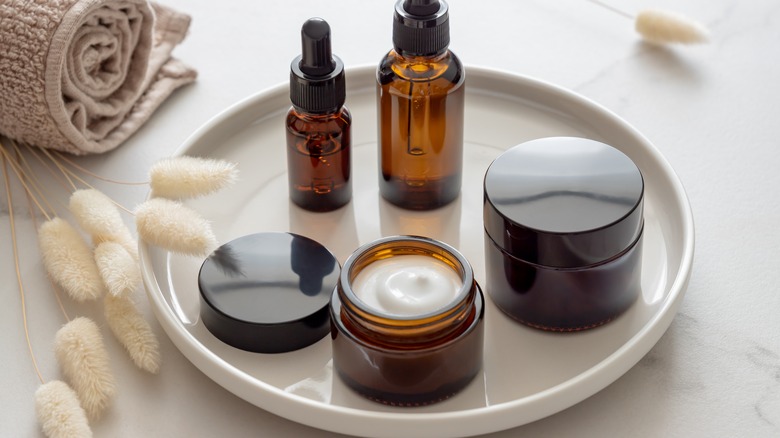Here's Why You Need To Look Out For Collagen On A Nutrition Label If You're Vegan
Finding the right supplements for your body can be quite the challenge — there are so many things to consider before you start your supplement search. One thing to consider is how supplements might impact any medications you're already taking. According to the Mayo Clinic, anyone seeking to add new supplements to their diet should think twice before mixing them with their prescriptions. While that's one consideration, people who have decided to live a vegan lifestyle might find the supplement situation to be even more tricky to navigate.
Being vegan comes with a host of great benefits. Dr. Jeff Soble, a cardiologist at RUSH Medical Center, says he became vegan because of his family's history of heart disease. But this lifestyle isn't without its share of challenges, Dr. Soble notes, "Whatever your diet choice, you have to know which foods to avoid and which foods to seek out."
Along with making healthy eating choices, vegans should be aware of supplements that contain animal products. But does that include collagen?
Is collagen vegan?
The experts may say that taking collagen — and using a collagen-based product — offers many perks, but is this popular supplement really something vegans should have stored in their medicine cabinet?
The answer is to be cautious. At its natural root, collagen is a type of protein. In fact, it is the most abundant protein found in living creatures (via Healthline.) Although there are 28 types of collagen, the most commonly found type is type I. Type I collagen is in the connective tissue, skin, tendons, bones, and cartilage of animals.
This means that, sadly, products containing natural collagen are more than likely produced from removing these proteins from the aforementioned animal by-products. All of this can potentially leave vegans between a rock and a hard place. After all, medical professionals tell us that collagen is essential to healthy diets since it constitutes an enormous part of our chemical makeup (via WebMD). Thankfully, there seem to be vegan collagen supplement alternatives that are available.
How to get collagen if you're a vegan
Unfortunately, finding good sources of collagen might prove difficult for those living the vegan lifestyle. Because collagen is a protein found mostly in meat, vegans are advised to steer clear of anything that doesn't label its collagen as "plant produced." But does such a product exist when collagen is derived from tissue and cartilage?
It's a bit of a convoluted answer. Research is being done on how to successfully manufacture collagen in an animal-free way, but more research is needed before we'll have conclusive results on its effectiveness (via WebMD). Still, if you look online, you are sure to find many products that claim to have vegan collagen supplements. It's always advised to research the company website you're buying from before using their products.
One great and natural way to get your body producing collagen is to eat foods that aid in the process. Some of the key nutrients that get your body pumping collagen are zinc, vitamin C, and copper (via Medical News Today.) You can get these nutrients by eating nuts, fruits, whole grains, and green vegetables.


